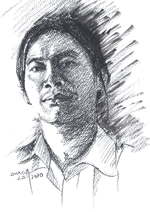This week’s release of just a handful of political prisoners bitterly disappointed many in Burma. Dissidents saw the move as proof that Naypyidaw had not changed—that the so-called “reforms” were all a facade. The public vented its collective anger on social media and in emails to each other.
The main target of their vitriol was of course the president, Thein Sein, and the other high-ranking officials who had—over the past weeks and months—gone out on a limb to promise that political opponents would soon be freed from prison.
But when criticism spread to opposition leader Aung San Suu Kyi for her perceived role as an accomplice, The Lady herself had to react quickly to urge everyone to keep a cool head and to remind the gloomy public that the president alone could not enact reforms single-handedly.
 |
Aung Zaw is founder and editor of the Irrawaddy magazine. He can be reached at [email protected].
|
A senior official close to the president confirmed the sentiment by disclosing that the decision to release just over 30 activists was the result of an ongoing power struggle between Thein Sein and the hardliners.
In an interview with The Associated Press, Suu Kyi cautioned against too much faith in the current changes, and said that Burma’s long-ruling military still wields enormous power despite the veneer of democracy provided by the elections.
“I am concerned about how much support there is in the military for change,” she said. “In the end, that’s the most important factor—how far the military are prepared to cooperate with the principles of reform.”
Analysts inside the country pointed to the powerful National Defense Security Council (NDSC) and to Snr-Gen Than Shwe, the retired dictator who may continue to exercise influence from behind the scenes.
“As long as Than Shwe is alive, don’t expect any genuine change in this country,” said an outspoken editor in Rangoon who, on this occasion, requested anonymity.
High-ranking officials have leaked the fact that recent NDSC meetings have been peppered with discord, and that the political prisoners issue is one of its most divisive.
Chairing the meetings is the president, Thein Sein, a former military general, but one who is reputed to be honest and sincere. Even skeptics admit that he is arguably the least corrupt of the top-ranking officers, and the general with the cleanest hands when it comes to the blood of past human rights abuses.
The Council is comprised of 11 senior government leaders, 10 of whom were previously military generals. The team includes the two vice-presidents, the commander-in-chief and deputy commander-in-chief of the armed forces, and the ministers of defense, home affairs, foreign affairs and border affairs. The speakers of both Houses are also members of the NDSC, and on occasion Information Minister Kyaw Hsan is invited to sit in as an observer.
Together the NDSC represents the inner circle of government in Burma; its members hold sway over all the highest priority matters, including national security, economy, and the pace of democratic reform.
Aides claim that the president usually makes the final decision on any particular issue, but that he is an attentive listener and prefers to hear competing angles before he commits himself.
However, it also appears that military hardliners still hold the power to overrule any decision. First vice-president, Tin Aung Myint Oo, is renowned as a battle-hardened general, but is also reputedly one of the most corrupt officials, loyal to Than Shwe, and always ready to stamp down on any dovishness at the NDSC and to maintain the status quo.
The hawks in the Council argue that releasing prominent dissidents will endanger national stability. It won’t. And Thein Sein, who served in the armed forces since 1968, knows that.
Inside sources say that Thein Sein faces mounting challenges to his authority—a suggestion he appeared more than willing to share with Western diplomats.
One story goes that when the president saw the news report published in both The Irrawaddy and the Bangkok Post that suggested that Tin Aung Myint Oo was constantly undermining him and was perhaps positioning himself in the driving seat for a military coup, he simply asked his staff to bring him extra copies of the news article. He then pinned a short note to the clippings and sent them over to the vice-president's office.

